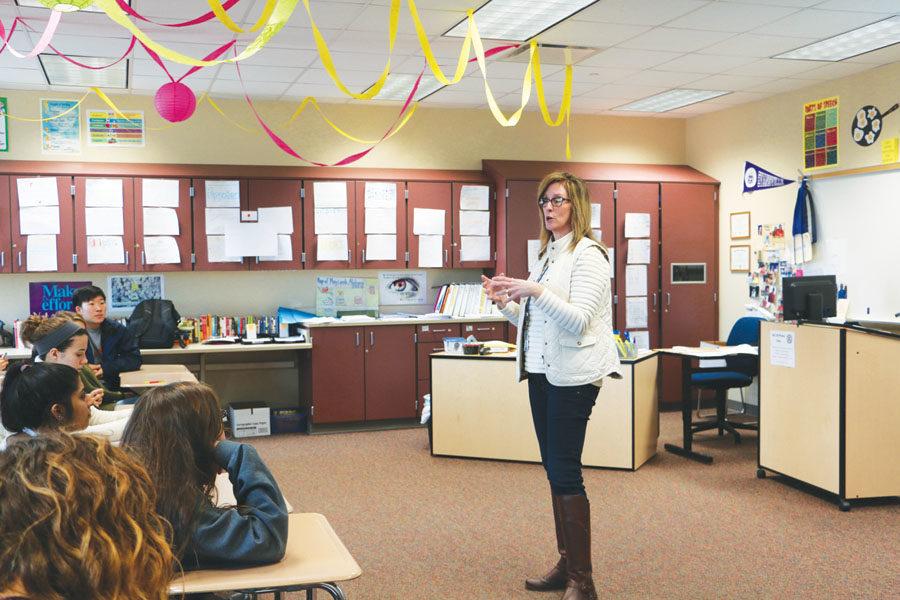Governor Mike Pence recently signed into law a bill that reformed many aspects of education. Although the bill focuses on many other subjects concerning the education department, the main aspect of the bill is the ISTEP test repeal that will become operational after the 2017 school year. A panel of educators and lawmakers will decide on a new alternative standardized test that will be announced by Dec. 1.
Many students and teachers here said they are content about the early move for change. English teacher Jana Cosler said she is happy with this turn of events.
“I think this is great news; we need a more standardized measure of kids, along with a reduction in time testing,” Cosler said. “The increase in testing caused by ISTEP and (ECA) is out of line with the Common Core standard, and more testing is not the answer to fix problem schools.”
English teacher Kristin Lentz said she is glad the IDOE is reacting so quickly to the situation, but said she understands the frustration that comes with it.
“I think (legislators) putting a lot of time into it and making a good decision. I don’t know very many people that thought it was a good idea, so I like the fact that they’re actually recognizing it and hopefully doing something sooner versus later,” She said. “It’s frustrating to (the administrators of the ISTEP), but unfortunately this happens, not maybe on the level of ISTEP, like with the common core a couple of years ago, we were ready to roll it out and launch it, but then Indiana backed off of it and established their own state standard….So things like that happen in education and I think administrators and teachers have learned to be a lot more flexible. You learn to not get attached to something because chances are it’ll go away eventually, or change.”
Assistant Principal Bradley Sever said he cannot predict what the IDOE has in store for the future, so he said he will cross that bridge when the time comes.
“I just take it a day at a time. Several years ago we thought the state was going to go to this new assessment called the Smarter Balanced Assessment Consortium (SBAC), or the PARCC assessment, which other states have gone to, but the General Assembly voted not to do that; they instead gained their contract with Pearson for the new ISTEP,” He said. “If I start thinking about two or three years from now, it becomes overwhelming knowing that I can’t control the decisions made by the General Assembly, but I just focus on day to day, year to year, season to season, semester to semester what needs to happen at Carmel High School to create the best environment for student testing.”
Freshman Jakob Pearson said, “I’m slightly saddened I will still have to take (the ISTEP), but I’m glad the future incoming freshmen will not have to take it and not have to suffer through it. No one should be subject to this test.”
Pearson also said,“ISTEP doesn’t really work, especially when it comes to learning styles. Different learning styles require different approaches, and the ISTEP assumes a one-size-fits-all approach, which doesn’t work.”
Sever said even though he cannot tell what the IDOE will replace the ISTEP with, he said he hopes it will be something close to his ideal type of testing.
“Personally the type of assessments that I think are most meaningful would be two-fold…I heard this author and educator, his name is Dylan Williams, speak, and he writes a lot of books and is a consultant on assessments… I heard him speak 10 years ago that I think about all the time and he said a really good example of a test is the drivers test because there’s a performance aspect and there’s a written aspect, and that really resonated with me,” he said. “I also think there’s a lot of validity in assessments that measure growth, for example the PSAT; now there’s a PSAT 8/9, the regular PSAT and the actual SAT, so now you’re not only being compared to other kids across the country but also yourself.”
For the original story by Aaron Seals and Rachael Tan, click right here:




























![Keep the New Gloves: Fighter Safety Is Non-Negotiable [opinion]](https://hilite.org/wp-content/uploads/2024/12/ufcglovescolumncover-1200x471.png)
















































![Review: “We Live in Time” leaves you wanting more [MUSE]](https://hilite.org/wp-content/uploads/2024/12/IMG_6358.jpg)
![Review: The premise of "Culinary Class Wars" is refreshingly unique and deserving of more attention [MUSE]](https://hilite.org/wp-content/uploads/2024/12/MUSE-class-wars-cover-2.png)
![Introducing: "The Muses Who Stole Christmas," a collection of reviews for you to follow through winter [MUSE]](https://hilite.org/wp-content/uploads/2024/12/winter-muse-4.gif)
![Review: "Meet Me Next Christmas" is a cheesy and predictable watch, but it was worth every minute [MUSE]](https://hilite.org/wp-content/uploads/2024/11/AAAAQVfRG2gwEuLhXTGm3856HuX2MTNs31Ok7fGgIVCoZbyeugVs1F4DZs-DgP0XadTDrnXHlbQo4DerjRXand9H1JKPM06cENmLl2RsINud2DMqIHzpXFS2n4zOkL3dr5m5i0nIVb3Cu3ataT_W2zGeDAJNd_E-1200x884.jpg)
![Review: "Gilmore Girls", the perfect fall show [MUSE]](https://hilite.org/wp-content/uploads/2024/11/gilmore-girls.png)
![Review in Print: Maripaz Villar brings a delightfully unique style to the world of WEBTOON [MUSE]](https://hilite.org/wp-content/uploads/2023/12/maripazcover-1200x960.jpg)
![Review: “The Sword of Kaigen” is a masterpiece [MUSE]](https://hilite.org/wp-content/uploads/2023/11/Screenshot-2023-11-26-201051.png)
![Review: Gateron Oil Kings, great linear switches, okay price [MUSE]](https://hilite.org/wp-content/uploads/2023/11/Screenshot-2023-11-26-200553.png)
![Review: “A Haunting in Venice” is a significant improvement from other Agatha Christie adaptations [MUSE]](https://hilite.org/wp-content/uploads/2023/11/e7ee2938a6d422669771bce6d8088521.jpg)
![Review: A Thanksgiving story from elementary school, still just as interesting [MUSE]](https://hilite.org/wp-content/uploads/2023/11/Screenshot-2023-11-26-195514-987x1200.png)
![Review: "When I Fly Towards You", cute, uplifting youth drama [MUSE]](https://hilite.org/wp-content/uploads/2023/09/When-I-Fly-Towards-You-Chinese-drama.png)
![Postcards from Muse: Hawaii Travel Diary [MUSE]](https://hilite.org/wp-content/uploads/2023/09/My-project-1-1200x1200.jpg)
![Review: "Ladybug & Cat Noir: The Movie," departure from original show [MUSE]](https://hilite.org/wp-content/uploads/2023/09/Ladybug__Cat_Noir_-_The_Movie_poster.jpg)
![Review in Print: "Hidden Love" is the cute, uplifting drama everyone needs [MUSE]](https://hilite.org/wp-content/uploads/2023/09/hiddenlovecover-e1693597208225-1030x1200.png)
![Review in Print: "Heartstopper" is the heartwarming queer romance we all need [MUSE]](https://hilite.org/wp-content/uploads/2023/08/museheartstoppercover-1200x654.png)




